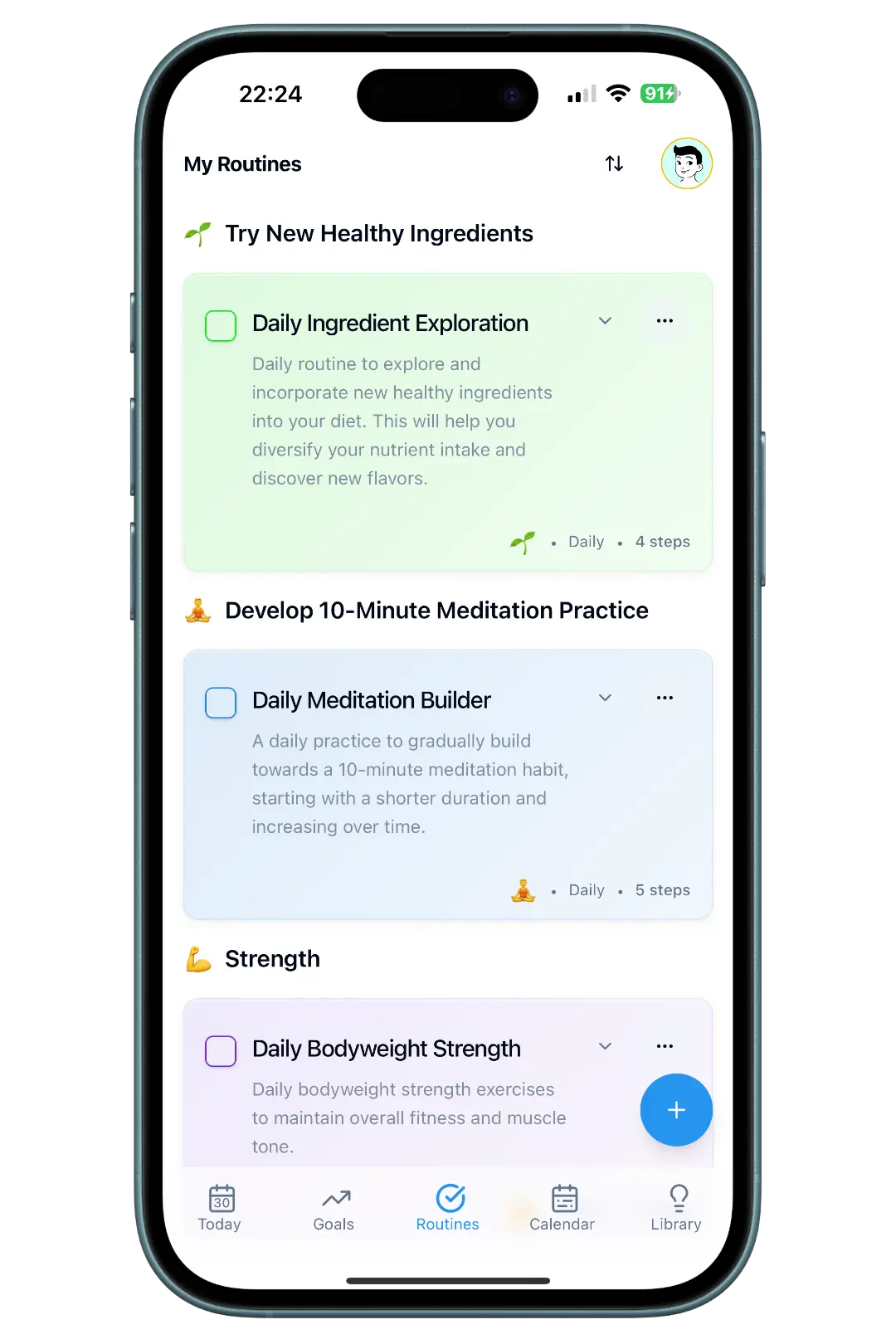
Calendar Your Way to Better Health: A Simple System
February 13, 2025
Your calendar reveals your true priorities. If health isn't explicitly scheduled in your calendar, it's not really a priority—no matter what you tell yourself. The most successful healthy people don't rely on finding time for wellness; they make time by calendaring it like any other important commitment. Here's the simple calendar system that transforms intentions into reality.
The Calendar Truth About Health
Why "Finding Time" for Health Never Works
The Finding Time Myth:
- "I'll exercise when I have time"
- "I'll meal prep if my schedule permits"
- "I'll focus on my health when work slows down"
- "I'll prioritize wellness after this busy period"
The Calendar Reality: Time is never "found"—it's only allocated. Without calendar allocation, health gets squeezed out by every other commitment that is scheduled.
The Power of Calendar Commitment
Unscheduled health intentions:
- Compete with every other demand for your time
- Get postponed when anything urgent appears
- Create daily decision fatigue about when to be healthy
- Lead to guilt and frustration about "not having time"
Calendared health commitments:
- Are protected from competing demands
- Happen regardless of motivation or mood
- Eliminate daily decisions about when to be healthy
- Create automatic progress toward wellness goals
The C.A.L.E.N.D.A.R. Health System
C - Commit to Health Time Blocks
Principle: Schedule health activities with the same respect you give work meetings or family commitments.
Health Time Block Categories:
Non-Negotiable Blocks (Daily):
- Morning movement: 15-30 minutes minimum
- Meal timing: Consistent breakfast, lunch, dinner windows
- Hydration reminders: Every 2 hours throughout the day
- Evening wind-down: 30-60 minutes before bed
Weekly Planning Blocks:
- Sunday meal prep: 1-2 hours for week preparation
- Weekly health review: 15 minutes in ProgressMade
- Grocery shopping: Dedicated time for healthy food procurement
- Physical activity planning: Schedule workouts like appointments
Monthly Health Blocks:
- Health goal review: Monthly progress assessment
- System optimization: Adjust calendar based on what's working
- Health investments: Time for research, learning, or professional consultations
- Calendar evolution: Update scheduling system based on lifestyle changes
A - Automate Health Scheduling
Principle: Remove the need to constantly reschedule health by creating recurring calendar events.
Automation Strategies:
Recurring Daily Events:
- Morning routine: Same time every day, marked as "busy"
- Meal times: Blocked calendar windows for eating
- Movement breaks: Every 2-3 hours during work
- Hydration reminders: Gentle calendar pings throughout day
Recurring Weekly Events:
- Grocery shopping: Same day and time each week
- Meal preparation: Batch cooking sessions
- Longer workouts: Scheduled like unmovable appointments
- Health planning: Weekly 15-minute system review
Seasonal Automations:
- Daylight changes: Automatic adjustment of morning/evening routines
- Weather patterns: Indoor/outdoor activity alternatives pre-scheduled
- Holiday periods: Modified health schedules for special seasons
- Travel periods: Adjusted health routines for different time zones
L - Link Health to Existing Commitments
Principle: Attach health activities to already-scheduled commitments to increase follow-through.
Linking Strategies:
Work Schedule Links:
- Before work: Morning routine linked to work start time
- Lunch break health: Movement or meal prep during designated breaks
- After work transition: Decompression routine before evening activities
- Work calendar gaps: Fill unexpected free time with micro health habits
Family Schedule Links:
- Family meal times: Healthy eating opportunities already built in
- Kids' activities: Exercise while they practice sports
- Weekend family time: Active outings and meal preparation together
- Evening routines: Wind-down practices that include family wellness
Social Calendar Links:
- Friend meetups: Choose active social activities
- Date nights: Include healthy restaurant choices or cooking together
- Group commitments: Join health-focused social groups
- Community events: Participate in active community activities
E - Establish Buffer Time
Principle: Build flexibility into your health calendar to accommodate life's unpredictability.
Buffer Time Strategies:
Daily Buffers:
- 15-minute morning buffer: Extra time for slower mornings
- Transition buffers: 5-10 minutes between activities for health micro-habits
- Evening buffer: Flexible wind-down time that adapts to daily energy
- Meal timing buffers: Flexible 30-minute windows rather than rigid times
Weekly Buffers:
- Makeup workout slots: Alternative times for missed exercise
- Flexible meal prep: Backup preparation times if primary slot doesn't work
- Health catch-up time: Dedicated slots for addressing week's health gaps
- Recovery protocols: Time to get back on track after disruptions
Monthly Buffers:
- Health system adjustment: Time to modify calendar based on experience
- Goal reassessment: Flexibility to change health focus if needed
- Calendar optimization: Regular review and improvement of scheduling system
- Life integration: Adaptation for changing life circumstances
N - Navigate Schedule Conflicts
Principle: Develop clear decision-making rules for when health and other commitments conflict.
Conflict Navigation Rules:
Priority Hierarchy:
- Emergency health needs: Always take precedence
- Foundation health habits: Protect core daily practices
- Scheduled health time: Treat like any other important appointment
- Optional health activities: Can be rescheduled if necessary
Conflict Resolution Strategies:
- Can the other commitment be moved? Try rescheduling non-health item first
- Can health activity be modified? Shorter version rather than complete skip
- Can activities be combined? Walking meeting, healthy lunch during work, etc.
- Is this truly unavoidable? Distinguish real conflicts from convenience choices
Emergency Protocols:
- Same-day makeup rules: Alternative times for missed health activities
- Minimum viable alternatives: What's the smallest health action you can take?
- Recovery planning: How to get back on schedule after disruptions
- Learning integration: How to prevent similar conflicts in the future
D - Designate Health Preparation Time
Principle: Schedule the behind-the-scenes activities that make healthy living possible.
Preparation Categories:
Daily Preparation (5-10 minutes):
- Evening setup: Lay out workout clothes, prep breakfast items
- Morning prep: Set up workspace for healthy workday choices
- Meal prep micro-sessions: Daily small preparations for tomorrow
- Environment refresh: Quick organization of health-supporting spaces
Weekly Preparation (30-60 minutes):
- Grocery planning: List creation and shopping preparation
- Meal planning: Next week's healthy eating strategy
- Workout planning: Exercise schedule and equipment preparation
- Calendar review: Next week's health scheduling optimization
Monthly Preparation (1-2 hours):
- Bulk shopping: Non-perishable healthy foods and supplies
- System evaluation: What preparation activities are most valuable?
- Goal assessment: Are current preparations supporting health goals?
- Preparation optimization: How to make preparation more efficient
A - Adjust Based on Results
Principle: Continuously optimize your calendar system based on real-world effectiveness.
Adjustment Mechanisms:
Weekly Calendar Review:
- Which scheduled health activities actually happened?
- What conflicts arose and how were they handled?
- Which time slots work best for different activities?
- What adjustments would improve next week's schedule?
Monthly System Evolution:
- Are you consistently meeting your calendared health commitments?
- How has your energy and health improved with scheduled wellness?
- What new health activities deserve calendar space?
- How can the system better integrate with your lifestyle?
Seasonal Calendar Optimization:
- How do seasonal changes affect optimal health scheduling?
- What works better in different seasons or life phases?
- How can the calendar system adapt to changing circumstances?
- What lessons can inform future calendar planning?
R - Reinforce with Tracking
Principle: Use ProgressMade to track both calendar adherence and health outcomes.
Tracking Categories:
Schedule Adherence Tracking:
- Calendar compliance: Percentage of scheduled health activities completed
- Conflict frequency: How often health time gets overridden
- Buffer utilization: How often backup time slots are needed
- Preparation effectiveness: Which prep activities most improve adherence
Health Outcome Tracking:
- Energy levels: How does scheduled health time affect daily energy?
- Mood patterns: Correlation between health scheduling and emotional well-being
- Progress metrics: Are scheduled health activities creating desired results?
- System satisfaction: How does calendar-based health feel vs. spontaneous attempts?
Implementing Your Health Calendar System
Week 1: Calendar Audit and Basic Scheduling
Goal: Understand current calendar patterns and add basic health blocks
Daily Actions:
- Track current time use for one week
- Identify optimal times for health activities based on energy patterns
- Add 2-3 basic health blocks to your calendar
- Practice treating health time like any other appointment
Week 2: Automation and Linking
Goal: Create recurring health events and connect to existing schedules
Daily Actions:
- Set up recurring daily health blocks
- Link health activities to existing commitments
- Add buffer time around health activities
- Test and adjust timing based on real-world experience
Week 3: Preparation and Conflict Management
Goal: Schedule preparation time and develop conflict resolution skills
Daily Actions:
- Add preparation time blocks to your calendar
- Practice conflict navigation rules when scheduling conflicts arise
- Build backup plans for common scheduling disruptions
- Document what preparation activities are most valuable
Week 4: System Optimization
Goal: Refine your health calendar system based on three weeks of data
Daily Actions:
- Review calendar adherence and adjust timing
- Optimize preparation activities based on effectiveness
- Plan next month's calendar evolution
- Share calendar system insights with accountability partners
Common Calendar Health Mistakes
Mistake 1: Under-Scheduling Health
Problem: Only scheduling major health activities, ignoring daily foundational practices Solution: Calendar micro-habits and preparation time alongside workout sessions
Mistake 2: Over-Rigid Scheduling
Problem: Creating such a detailed schedule that it breaks under real-life pressure Solution: Build flexibility and buffer time into all health scheduling
Mistake 3: Ignoring Energy Patterns
Problem: Scheduling health activities at times when you naturally have low energy Solution: Align health calendar with your natural energy rhythms
Mistake 4: No Conflict Protocols
Problem: Abandoning health commitments whenever schedule conflicts arise Solution: Develop clear rules for navigating calendar conflicts before they happen
Your 30-Day Calendar Health Challenge
Week 1: Basic health time blocking and recurring event setup Week 2: Advanced scheduling with preparation time and conflict management Week 3: Integration with existing commitments and social calendar Week 4: System optimization and planning for sustainable long-term use
The Calendar Health Promise
When you treat your health with the same calendar respect you give work and family commitments, something magical happens: wellness stops being something you "try to fit in" and becomes something that naturally happens as part of your structured life.
After 30 days of health calendar management:
- Automatic wellness: Health activities happen without daily decisions
- Protected time: Your wellness time is defended against competing demands
- Reduced guilt: No more stress about "not having time" for health
- Consistent progress: Regular calendar commitment creates compound health improvements
Your calendar is your life—make sure your health has a place in it.
Start today by adding one health commitment to your calendar. Treat it like the important appointment it is.
What will be the first health activity you calendar?
